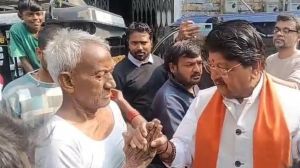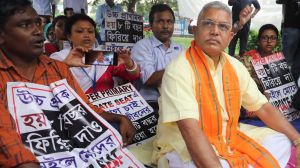Unholy alliance
Whenever human beings are faced with a crisis, they turn to God. They hope that the Almighty, who is omnipresent and speaks through each o...

Whenever human beings are faced with a crisis, they turn to God. They hope that the Almighty, who is omnipresent and speaks through each one8217;s conscience, will instantly come to their rescue. The Uttar Pradesh chief minister, Ram Prakash Gupta, not being an ordinary mortal, follows an entirely different rule. Now that he is clearly in trouble, given the disastrous performance of his party in the recently concluded panchayat polls he has, instead of turning to God, decided to listen to sants and sadhus who control enormous religious estates. It was precisely under pressure from the rich holy men that Gupta decided to repeal the 1962 Hindu Public Religious Places Act. According to Clause 7 2 and 9 B of this Act, public religious places 8212; Hindu, Buddhist and Jain 8212; having in their possession property worth more than Rs 50,000, or an annual income more than Rs 1,200, comes under the administration8217;s purview. Additionally, all religious property transfers required prior approval of a divisional commissionerrank officer. In effect, this Act was a legal check against the rampant misuse of religious institutions, their funds and property.
Indeed, Gupta8217;s repeal of the 1962 Act was a total reversal of a previous government order of December 10, 1999, according to which the administration was empowered to conduct a survey of properties owned by maths, temples and other religious associations. Gupta was so keen to appease the lobby of rich holy men that throwing all notions of collective responsibility to the winds he ended up blaming his minister of culture, Ramesh Pokhariyal Nishank8217;, for the order. While responding to why the Act was repealed by his government, Gupta replied that this was to prevent bureaucratic interference in religious matters. Gupta8217;s reasoning cannot be faulted. The distinction between the ecclesiastical and the temporal is not merely Western. Even in the classical Indian tradition, while dharma is recognised as being inspired by sattwik tendencies, rajniti clearly lies in the realm of the tamasic. The state, therefore, has no business to intervene in matters of faith. That should lie in theprivate sphere. But violations of the public norm should, by the same logic, be the prerogative of the administration.
As elsewhere in UP, too, there are numerous cases of frauds committed in the name of religion. In fact, close to 150 cases of fraudulent transactions8217; are being looked into by various investigative agencies in UP alone, which include five cases of money laundering and FERA violations being inquired by the CBI. Unless there are institutions to ensure that violations of public order in the name of religion must end, the sanctity of religion itself might be under serious threat. Clearly, Gupta8217;s compulsions are far from sacred; they appear tainted by the profane. The political compulsions arising out of the impending assembly elections cannot be entirely ruled out. Given the sense of attrition in the most backward class voters, mobilised and cultivated by Kalyan Singh, this may be Gupta8217;s strategy of retaining the conservative and dominant Brahmin vote-banks. But that is clearly bad politics since the threat to Gupta is not from the right but from the left.
- 01
- 02
- 03
- 04
- 05































